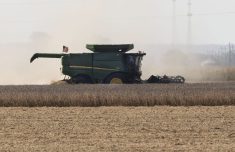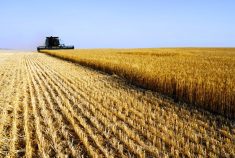VANCOUVER — Observation: organic crops have more weeds than conventional crops and organic crops yield less than conventional.
Assumption: weeds cut into production, which might explain the yield gap between the two systems.
However, Dilshan Benaragama, a University of Saskatchewan PhD candidate in plant science, said that assumption is false.
“That’s a misconception. We think that when you have more weed density there’s going to be a big yield loss,” said Benaragama, who spoke at the Weed Science Society of America annual conference in Vancouver Feb. 4. “Organic systems have lower yields (even when there are) no weeds.”
Read Also

Alberta harvest wrapping up: report
Harvest operations advanced to 96 per cent complete in Alberta as of Oct. 7, with only a few late-seeded cereal and canola fields remaining, according to the latest provincial crop report.
Benaragama, who participated in the graduate student oral presentation contest, conducted plot trials in 2011 and 2012 at the Agriculture Canada research centre in Saskatoon to evaluate how weed competition and rotation influences the yield of organic and conventional crops.
He said certain studies indicate that organic systems yield five to 30 percent less than conventional systems.
He wanted to know if increasing the crop diversity in an organic rotation would reduce yield loss caused by weed competition. Also, he wanted to know if weed competition is similar in organic and conventional systems.
To answer those questions, Benaragama looked at three crop rotations: high diversity with annuals and perennials, low diversity with wheat and canola and a diverse annual system with cereals, canola and pulses.
On top of that, he considered four weed scenarios: weed free (hand weed), no weed control, herbicides and seeding tame oats into plots to simulate a high level of weed pressure.
He determined that diverse rotations did reduce weed pressure, but yields remained lower than conventional treatments.
“No matter what the rotation is, organic has low grain yield compared with conventional.”
As well, regardless of weed treatment, organic yields were lower than conventional, he said.
“Under weed free conditions, organic has lower yield. No matter (if) weeds are present or not, still, organic systems are having (lower) yield,” he said following his presentation in Vancouver. “What this says is that crop weed competition is not a limiting factor on these (organic) systems.”
Clarifying his point, Benaragama said weeds do reduce crop yields in organic and conventional systems, but other factors are likely responsible for the yield gap between organic and conventional.
Steve Shirtliffe, U of S plant science professor and Benaragama’s adviser, said fertility often restricts organic yields.
“You almost always see a yield penalty with organic rotations unless they’re really heavily manured…. (But) in those situations they can yield even better.”
Benaragama said American organic farmers tend to add more inputs to their soil, through compost or growing green manure crops.
Organic farmers in Saskatchewan may be relying too much on rotation to enhance soil fertility, he said.
“In our cropping system in Saskatchewan, soil fertility is the main problem.”
To test out his theory, Benaragama is conducting greenhouse experiments on conventional and organic soils to understand the role of nutrients.
“We think the limiting factor here is nitrogen and phosphorus…. We’re trying to bring these (organic soils) to levels of conventional systems. Then compare the crop weed competition.”

















